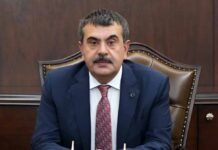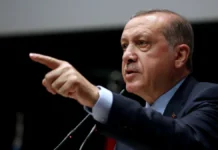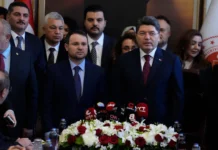The Committee to Protect Journalists has called on Turkish authorities to conduct an impartial and depoliticized investigation into the killing of Turkish-Armenian journalist Hrant Dink and ensure that all those involved in planning and committing the murder are held to account.
The 52-year-old Dink, editor-in-chief of the Turkish-Armenian bilingual Agos weekly, was shot dead with two bullets to the head outside the newspaper’s headquarters in central İstanbul on January 19, 2007 by a then-17-year-old jobless high-school dropout.
The verdict handed down on March 26 by the İstanbul 14th High Criminal Court during the final hearing in the trial of 76 defendants – the majority of them public officials – accused of having had a role in Dink’s killing included 33 acquittals and 27 convictions.
“The prosecution of the murder of Turkish journalist Hrant Dink remains unsatisfactory, as voiced by the Dink family and their lawyers,” said Gulnoza Said, CPJ’s Europe and Central Asia program coordinator in New York. “Turkish authorities must allow an unbiased, comprehensive investigation into each actor suspected of involvement in the conspiracy and leave nothing in the dark. The family’s appeal should present authorities with a fresh chance to treat this case with the seriousness it deserves.”
The CPJ underlined that political shifts against US-based Muslim cleric Fethullah Gülen have affected the investigation into Dink’s killing, citing its previous reports.
On Friday the family of Dink said the court ruling wasn’t convincing because the trial did not include the real actors behind the journalist’s assassination. The family underlined that Dink was murdered at the end of a three-year period during which the journalist was “threatened and pointed to as a target by officials from Turkey’s General Staff, politicians, journalists and members of pro-government associations.”
Ramazan Akyürek and Ali Fuat Yilmazer, two of the jailed defendants and former police chiefs, were given aggravated life sentences by the Turkish court, while four defendants, including former gendarmerie members Muharrem Demirkale and Yavuz Karakaya, received life sentences.
Separating the files of 13 fugitive suspects, including Fethullah Gülen, on the grounds that their defense statements were not delivered, the court also ruled that Dink’s murder was committed “in line with the objectives of FETÖ” – a derogatory term used by the Turkish government to refer to the faith-based movement inspired by Gülen as a terrorist organization.
For years, prosecutors have looked into alleged links between the suspects and Gülen, who is accused of masterminding a failed coup against President Recep Tayyip Erdoğan in 2016, although he strongly denies the charges.
The Turkish government’s ongoing crackdown on the Gülen movement was launched following corruption investigations in late 2013 that implicated Erdoğan’s close circle and culminated in the aftermath of a failed coup on July 15, 2016.
Although both Gülen and his followers deny any involvement in the abortive putsch and in any terrorist activities, a total of 622,646 people have been investigated and 301,932 have been detained, while 96,000 others have been jailed due to alleged links to the group since the failed coup, according to the latest Interior Ministry data. The data further shows that there are currently 25,467 people in Turkey’s prisons who were jailed on alleged links to the faith-based movement.
















[…] observers such as the Committee to Protect Journalists (CPJ) have described the investigation into the assassination as […]